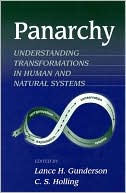Panarchy: Understanding Transformations in Human and Natural Systems
Search in google:
<p>Creating institutions to meet the challenge of sustainability is arguably the most important task confronting society; it is also dauntingly complex. Ecological, economic, and social elements all play a role, but despite ongoing efforts, researchers have yet to succeed in integrating the various disciplines in a way that gives adequate representation to the insights of each.<p>Panarchy, a term devised to describe evolving hierarchical systems with multiple interrelated elements, offers an important new framework for understanding and resolving this dilemma. Panarchy is the structure in which systems, including those of nature (e.g., forests) and of humans (e.g., capitalism), as well as combined human-natural systems (e.g., institutions that govern natural resource use such as the Forest Service), are interlinked in continual adaptive cycles of growth, accumulation, restructuring, and renewal. These transformational cycles take place at scales ranging from a drop of water to the biosphere, over periods from days to geologic epochs. By understanding these cycles and their scales, researchers can identify the points at which a system is capable of accepting positive change, and can use those leverage points to foster resilience and sustainability within the system.<p>This volume brings together leading thinkers on the subject-including Fikret Berkes, Buz Brock, Steve Carpenter, Carl Folke, Lance Gunderson, C.S. Holling, Don Ludwig, Karl-G? M?r, Charles Perrings, Marten Scheffer, Brian Walker, and Frances Westley-to develop and examine the concept of panarchy and to consider how it can be applied to human, natural, and human-natural systems. Throughout, contributors seek to identify adaptive approaches to management that recognize uncertainty and encourage innovation while fostering resilience.<p>The book is a fundamental new development in a widely acclaimed line of inquiry. It represents the first step in integrating disciplinary knowledge for the adaptive management of human-natural systems across widely divergent scales, and offers an important base of knowledge from which institutions for adaptive management can be developed. It will be an invaluable source of ideas and understanding for students, researchers, and professionals involved with ecology, conservation biology, ecological economics, environmental policy, or related fields. Booknews Earth scientists and economists from the four hemispheres embarked on a three-year project to identify how economic growth and human development depend on joint attributes of ecosystems and institutions; and to seek ways to identify, monitor, and maintain those attributes, or restore them if eroded. They used the ecological notion of resilience and its corollary precepts in social science. Here are their findings. Annotation c. Book News, Inc., Portland, OR (booknews.com)
List of FiguresList of TablesList of BoxesPrefaceCh. 1In Quest of a Theory of Adaptive Change3Ch. 2Resilience and Adaptive Cycles25Ch. 3Sustainability and Panarchies63Ch. 4Why Systems of People and Nature Are Not Just Social and Ecological Systems103Ch. 5Back to the Future: Ecosystem Dynamics and Local Knowledge121Ch. 6The Dynamics of Political Discourse in Seeking Sustainability147Ch. 7Collapse, Learning, and Renewal173Ch. 8Dynamics Interaction of Societies and Ecosystems - Linking Theories from Ecology, Economy, and Sociology195Ch. 9A Future of Surprises241Ch. 10Resilience and Sustainability: The Economic Analysis of Nonlinear Dynamic Systems261Ch. 11Resilient Rangelands - Adaptation in Complex Systems293Ch. 12Surprises and Sustainability: Cycles of Renewal in the Everglades315Ch. 13The Devil in the Dynamics: Adaptive Management on the Front Lines333Ch. 14Planning for Resilience: Scenarios, Surprises, and Branch Points361Ch. 15Discoveries for Sustainable Futures395Ch. 16Toward an Integrative Synthesis419App. AA Model for Ecosystems with Alternative Stable States439App. BOptimizing Social Utility from Lake Use441App. CTax as a Way to Direct Society443App. DCollective Action Problems and Their Effect on Political Power445References449List of Contributors489Index493








